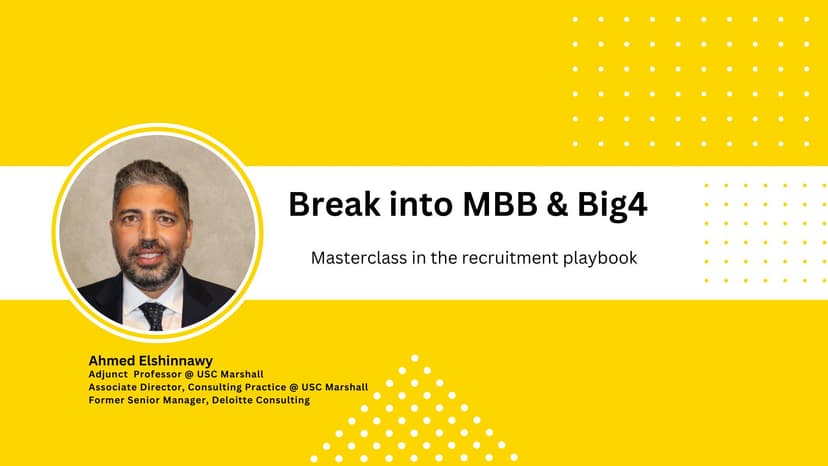McKinsey Solve Game: What it Is & How to Beat It
In this in-depth article, we delve into the intricacies of the McKinsey Game, shedding light on what it is and providing valuable insights on how to nail this step in the consulting recruitment process.
Posted June 13, 2025

Join a free event
Learn from top coaches and industry experts in live, interactive sessions you can join for free.
Table of Contents
The McKinsey Game, or Solve as it is commonly referred to, is a problem-solving approach employed by the consulting firm McKinsey & Company. The purpose of the McKinsey Solve Game is to challenge your critical thinking, decision making, and problem solving skills as a leader to determine if your cognitive abilities and business knowledge align with the candidate requirements.
In this article, we unravel the details of the McKinsey Solve Game, delving into its core principles and uncovering the strategies that can lead aspiring consultants to nail this step in the recruiting process. Whether you aspire to join the ranks of McKinsey or simply seek to sharpen your problem-solving acumen and critical reasoning, understanding the intricacies of the McKinsey Solve Game will prove invaluable in your quest for success in the consulting world.
What is the McKinsey Solve Game?
The McKinsey Solve Game is an online assessment that candidates complete independently, typically lasting between 60-90 minutes. It’s a gamified test that replaces traditional numerical and verbal reasoning tests. This game provides McKinsey with insight into your natural problem-solving approach and allows candidates to demonstrate cognitive skills without needing prior consulting knowledge. The game is adaptive, meaning it changes according to the candidate’s choices, and there is no “right answer” for each part.
Originally founded by Imbellus in 2017 and then reinvigorated in Spring 2023 to include the Redrock Case Study, the McKinsey Game aims to depart from traditional candidate screening assessments. Specifically, the platform uses ecology-themed video games that involve tasks such as constructing food chains, safeguarding endangered species, managing predator and prey populations, and diagnosing animal diseases or identifying natural disasters.
Why Does McKinsey Use Solve?
Now, you are likely wondering why a prestigious consulting firm would use an ecology-based video game as part of its recruiting process. The firm uses the McKinsey Game with the goal of removing inherent advantages, leveling the playing field, and learning how you think. The McKinsey Game’s scientific foundation and game-based assessments provide McKinsey with objective data about a candidate’s cognitive and emotional traits, helping them identify individuals who align with their specific job requirements and company culture. Ultimately, this allows McKinsey to make more informed and fair hiring decisions, leading to a more diverse and talented workforce.
Structure of the McKinsey Solve Game Test
The McKinsey Solve Game consists of different modules or scenarios, each testing specific skills:
- Ecosystem Building – In this module, candidates are tasked with creating a balanced ecosystem by selecting and placing various species within a specific environment. Each decision impacts the ecosystem's stability, assessing strategic planning, adaptability, and resource management skills.
- Redrock Case Study – Replacing the previous Plant Defense module, the Redrock Case Study requires candidates to analyze ecological data to optimize biodiversity on Redrock Island. This module evaluates analytical thinking, data interpretation, and decision-making abilities.
- Ocean Cleanup – Introduced in 2024, the Ocean Cleanup module involves developing strategies to remove pollutants from marine environments. This scenario tests problem-solving skills, environmental awareness, and the ability to devise sustainable solutions.
What Skills Are Being Assessed in McKinsey Solve?
The McKinsey Solve Game assesses several core competencies that are crucial for a consulting role. Each module in the game is designed to test a candidate’s instinctive approach to problem-solving, analytical skills, and ability to adapt under pressure. Let’s break down how each skill is specifically evaluated in the game:
Analytical and Quantitative Reasoning
The McKinsey Solve Game requires candidates to interpret and analyze complex data to make well-reasoned decisions. Here’s how it assesses this skill:
- In modules like the “Redrock Case Study” or “Ocean Cleanup,” you are presented with data on biodiversity, pollution levels, or ecological factors. You must interpret this data to make decisions that will drive the success of the ecosystem or cleanup strategy.
- The game also challenges you to identify trends and patterns in data under time constraints. For example, in “Redrock Case Study,” understanding which species require protection and how to balance biodiversity requires you to recognize patterns in species data and environmental impacts.
- Many decisions in the game, such as how to allocate resources to different organisms in the “Ecosystem Building” module, are based on quantifiable factors. You need to analyze which areas require the most attention or resources to maximize overall outcomes, directly testing your quantitative reasoning skills.
Adaptability and Agility
The McKinsey Solve Game assesses adaptability through dynamic scenarios that evolve based on your decisions. This element simulates the consulting environment, where conditions often change rapidly, requiring consultants to pivot and re-strategize.
- In the “Ecosystem Building” module, for instance, new species or environmental factors may appear based on your previous choices. This forces you to quickly adapt your strategy and rethink priorities.
- Certain decisions might lead to unforeseen outcomes, requiring you to adjust your approach in real-time. For example, choosing certain strategies in “Ocean Cleanup” might lead to shifts in pollution levels, requiring immediate attention and adaptation.
- Throughout the game, each decision may have long-term effects that alter the outcome of future choices. This aspect tests your ability to adapt while keeping an eye on both immediate and potential long-term impacts.
Strategic Thinking and Prioritization
The game requires you to prioritize your actions effectively, as resources are limited and trade-offs are often necessary. Here’s how it assesses strategic thinking:
- In the “Ecosystem Building” module, you’re given limited resources to maintain the balance and health of an ecosystem. You have to decide which species need the most support, which can survive on their own, and how to balance short-term needs with long-term ecosystem stability.
- Each module presents you with multiple goals that often conflict with one another. For instance, in “Redrock Case Study,” you may have to balance species protection and ecosystem growth, forcing you to prioritize which aspects need immediate attention versus those that can withstand potential risks.
Since each scenario has multiple paths and outcomes, you’re constantly strategizing to maximize your success in the scenario. Whether you’re trying to optimize biodiversity or manage resources in response to pollution, the game encourages forward-thinking and strategic prioritization.
Problem Solving and Innovation
Problem-solving and innovation are core skills in consulting, and the McKinsey Solve Game encourages innovative solutions by providing open-ended scenarios with no predefined answers.
- The “Ocean Cleanup” module doesn’t tell you exactly how to remove pollutants but gives you options to test various cleanup methods. This freedom allows you to experiment, think creatively, and explore unconventional solutions, testing your willingness to innovate.
- As you make decisions, you may encounter immediate feedback or results, allowing you to test hypotheses and adapt your approach. For example, if one cleanup method in the “Ocean Cleanup” module proves ineffective, you need to quickly pivot and try alternative strategies.
The game’s design intentionally leaves room for ambiguity, requiring you to navigate scenarios where information may be incomplete or unclear. This simulates real-world consulting, where consultants often work with limited information, encouraging you to innovate and take calculated risks based on the data at hand.
Key Takeaways
- Focus on flexibility over perfection. There are no single “right” answers in the McKinsey Solve Game; instead, it values adaptability. Approach each scenario with an open mind and be ready to pivot based on new information and unexpected outcomes.
- Think big picture, but stay detail-oriented. Balancing the immediate details with a long-term strategy is critical. McKinsey looks for candidates who can keep overarching goals in view while making informed, data-driven decisions along the way.
- Embrace ambiguity and experimentation. The game challenges you to work with incomplete information, so be comfortable taking calculated risks and exploring different solutions. Embrace the uncertainty as an opportunity to demonstrate your problem-solving approach.
- Practice calm decision-making. The Solve Game is designed to simulate high-pressure, real-world consulting scenarios. Staying calm and composed will help you make thoughtful choices, especially when the pressure is on.
How to Prepare for the McKinsey Solve Game
To succeed in the McKinsey Solve Game, it’s important to start by building the skills that the game tests, particularly data analysis, adaptability, and calm decision making. Here are some ways to approach the preparation.
Prepare Early
Preparing for the Solve Game early can give you a significant advantage. By familiarizing yourself with ecological concepts, data analysis techniques, and basic operations, you can improve your performance.
1. Improve your data interpretation skills.
Get comfortable with complex data formats like graphs, tables, and charts. Modules like “Disease Control” will require you to analyze trends in infection rates and other data points under time constraints, so work on exercises that push you to identify patterns quickly. Aim for timed practice sessions that train you to capture key insights without getting bogged down in details.
Exercises:
- Timed data analysis worksheets or GMAT Integrated Reasoning practice.
- Analyze publicly available data sets (e.g., Kaggle, Google Dataset Search) with a focus on quickly identifying trends and insights.
2. Learn how to adapt with the information provided.
Because the game’s scenarios change based on your choices, it’s important to learn how to make fast decisions based on limited information. To build this, try working with evolving, scenario-based decision-making games where conditions shift as you progress. These exercises can help you stay flexible in your approach and teach you to adapt to unexpected changes, just as you would in real consulting situations.
Expert Tip: Remember, the Solve Game isn’t about finding a “perfect” answer; it’s about staying open-minded and being ready to pivot when outcomes deviate from your expectations.
Exercises:
- Play dynamic simulation games like Pandemic 2 or Plague Inc., or strategic board games like chess.
- Study industry-specific case resources from Harvard Business Review or consulting prep books to familiarize yourself with real-world problem-solving scenarios.
3. Get better at prioritizing, strategically.
Strategic thinking is extra important in modules like “Ecosystem Building,” where resource management becomes crucial. Practice prioritizing tasks by setting clear goals and managing “resources” strategically, as this will help you become adept at balancing immediate needs with long-term impacts. Think about every decision’s short- and long-term effects—something you can simulate with case studies or strategy-focused exercises. Each choice in the game has consequences, so developing this balance between immediate and sustained impact will be invaluable.
Exercises:
- Resource management games such as SimCity or Civilization, which require balancing short- and long-term objectives.
- Work through business case studies that involve resource allocation challenges to practice prioritization and strategic thinking.
4. Keep your cool.
Maintaining composure under pressure is essential to performing well in the Solve Game’s timed scenarios. To prepare, simulate time pressure by setting up strict time limits on problem-solving tasks. This approach can help you build resilience and learn to make thoughtful decisions even with the clock ticking. Practicing calm decision-making techniques, like focused breathing or visualization, can also be helpful, allowing you to stay grounded and clear-headed in high-stakes moments. The ability to keep a level head will help you approach the game with clarity, even when it feels intense.
Exercises:
- Simulate time pressure with timed exams (e.g., GMAT, GRE) to build comfort in working efficiently under strict deadlines.
- Practice calm decision-making with breathing exercises or visualization techniques using apps like Headspace or Calm to enhance focus under stress.
Breakdown & Tips for Each McKinsey Solve Module
Ecosystem Building Game
The Ecosystem Building Game is a central part of the Solve Game. Candidates must create a self-sustaining ecosystem by constructing a balanced food chain and considering various environmental factors. This requires careful selection of both plants and animals to establish a functional ecosystem.
Description: Here, you are tasked with building a stable ecosystem in aquatic, alpine, or jungle environments. After choosing a setting, you need to carefully pick various plant and animal species to create a functional food chain within that setting. Importantly, recent iterations now require selecting a fixed number of eight species. Compatibility is crucial as the chosen species must be able to coexist with predators being able to consume their chosen prey, and all species must be capable of surviving the prevailing conditions of the selected location.
Strategy: Establish a structured process (i.e., build your food chain either from the top down or the bottom up). Then, opt for producers (plants/fungi/coral) that offer high caloric value and are consumed by multiple animal species; when feasible, select small animals/herbivores with low caloric needs but high caloric value provided. Be sure to come prepared with a piece of scratch paper nearby or a separate device to perform basic calculations on.
Skills Being Tested:
- Data analysis
- Basic calculations
Redrock Case Study
The Redrock Case Study is one of the newer elements of the McKinsey Game. In this exercise, candidates gather important data points, populate a research journal, and answer questions about the data. In the Redrock Case Study, candidates populate a research journal with critical information. Accurate data entry and reference to the journal are key to succeeding in this stage of the game.
Description: The Redrock Case Study is the McKinsey Game’s newest feature that has replaced the “Plant Defense Game” in 2023. Here, you are tasked with creating an ecological field study focused on wolf packs residing on an island. The primary objective is to devise a relocation plan for the pack(s) that ensures a harmonious balance with the surrounding species and enhances their chances of survival. There are four sections to the exercise:
- Investigation – Your goal is to efficiently extract the most significant data points from the full case description on various animal populations and drag-and-drop them into your “Research Journal” workspace since any information not saved at this stage will no longer be accessible in later sections.
- Analysis – You must answer three numerical questions using information you saved in the Investigation section.
- Report – Conduct a pre-written report on the wolf populations, including quantitative data
- Case Questions – Answer 10 questions regarding how you arrived at your solution
Strategy: Due to the diverse variants and constant evolution of the McKinsey Solve Game, the specific challenges you encounter can vary significantly. Be attentive to the instructions provided and carefully monitor your time based on them. Following the game, you will encounter a set of 10 multiple-choice questions that draw from the data you received during gameplay and your calculations. These questions may cover topics such as selecting appropriate graphic formats for specific information visualization or determining the percentage change in the wolf population under hypothetical scenarios. It is essential to manage your time wisely to allocate sufficient attention to answering the questions effectively (this is arguably the most important section of the task as it demonstrates your thought process and reasoning skills).
Skills Being Tested:
- Data analysis
- Basic calculations
- Reasoning
Ocean Cleanup
The Ocean Cleanup module is one of the newer additions to the McKinsey Solve Game. In this exercise, candidates analyze pollution levels, monitor marine health, and develop a cleanup strategy that effectively reduces contaminants while considering environmental sustainability. The focus is on assessing pollution data, making real-time adjustments, and evaluating the impact of different cleanup methods.
Description: In the Ocean Cleanup module, candidates are tasked with designing an effective strategy to reduce pollution in a virtual marine environment. The objective is to remove contaminants from the ocean in a way that balances environmental impact with cleanup efficiency. Throughout this module, you will gather and interpret data on pollution sources, water quality, and marine biodiversity, which you’ll use to select and adjust your cleanup techniques.
The module is divided into four main stages:
- Data Gathering – You’ll start by assessing pollution data from various sources. The information collected in this initial stage will serve as the foundation for your cleanup approach.
- Strategy Development – Using the collected data, you must select cleanup methods that target specific pollutants and maintain the ecosystem’s health. Options may include chemical treatments, biological methods, or mechanical removal, each with its pros and cons.
- Impact Monitoring – As you implement your chosen methods, you’ll track their effects on water quality and marine life. Unexpected consequences may arise, requiring you to adapt your strategy in real-time to minimize harm.
- Evaluation and Reporting – After completing your cleanup efforts, you will evaluate the results by examining water quality improvements and biodiversity impact. This final stage involves answering questions about your approach and decisions.
Strategy: The Ocean Cleanup module is a test of both analytical thinking and adaptability. Pay close attention to the initial data on pollution levels and marine health to inform your initial strategy, but be prepared to pivot based on real-time feedback. Managing time effectively across each stage is essential, particularly during the impact monitoring phase, where rapid adjustments may be needed. After the game, you’ll face questions based on your results and decision-making process, focusing on the effectiveness and sustainability of your strategy. These questions may require you to calculate percentages, assess method efficiency, or explain the reasoning behind your choices.
Skills Being Tested:
- Data analysis
- Environmental reasoning
- Strategic adaptability
- Quantitative evaluation
Ace the McKinsey Solve Game With the Help of an Expert
Prep for your McKinsey recruiting and interviews with the help of McKinsey consultants. Working with an expert coach can significantly help you improve your chances of landing the role with personalized, one-on-one support on your strengths and areas of improvement.
Final Tips to Excel in the McKinsey Solve Game
At this point you should feel much more confident in your abilities to ace the McKinsey Solve Game. Here are some final pieces of advice to make sure you’re as prepared as possible.
- Get really good at managing and interpreting data.
Since the Solve Game relies heavily on interpreting complex data, practice skimming for key details and organizing information effectively. This is crucial in modules like “Redrock Case Study” and “Ocean Cleanup,” where saving relevant data in a workspace is essential for referencing it later. To prepare, practice summarizing large data sets into concise insights to get comfortable with fast, efficient data handling. - Optimize your time management strategies.
Each module in the game has different stages, so efficiently allocating your time across these stages is essential. For example, in “Ecosystem Building,” divide your time between initial setup and ongoing adjustments. Mentally set a time limit for each section and practice working under countdowns to improve your pacing and maintain composure. - Be ready to pivot based on real-time feedback.
Adaptability is critical, as scenarios will often change based on your decisions. Throughout modules like “Ocean Cleanup,” unexpected results may require you to rethink strategies quickly. Approaching each scenario with an open mindset and practicing with real-time strategy games that involve shifting conditions can train you to stay flexible and adjust your approach on the fly. - Practice real-world problems with case studies.
The Solve Game mirrors consulting challenges, so reviewing case studies can help prepare you. Work through scenarios that require balancing competing objectives, such as environmental management or resource allocation. Business cases involving sustainability or population management can provide valuable practice, as these themes are often reflected in the game. - Improve your hypothesis-testing skills.
In modules like “Redrock Case Study,” hypothesis testing is key to successful decision-making. Practicing structured hypothesis testing using frameworks like MECE (Mutually Exclusive, Collectively Exhaustive) will ensure you’re covering all potential factors and allow you to make logical, calculated decisions in the game. - Use the post-game questions to explain and showcase your process.
After completing each module, you may encounter questions about your approach and calculations. Treat these as an opportunity to clearly explain your decision-making process. Practice summarizing complex decisions in concise, clear statements, as McKinsey values candidates who can articulate their thought process. - Stay composed and don’t rush through ambiguity.
The McKinsey Solve Game often presents ambiguous data, similar to real consulting work. Approach these situations calmly and use them to showcase your judgment. Practice handling incomplete data with logic puzzles or cases that involve partial information to develop a steady, methodical approach. - Supplement with strategic games and apps.
Digital tools that reinforce analytical and strategic thinking can complement your preparation. Apps like Lumosity or Peak offer logic and data analysis challenges similar to those in the Solve Game, while resource management games like Civilization or SimCity help you practice balancing priorities and adapting strategies in real-time.
Looking to break into McKinsey and other top consulting firms? Check out these expert resources dedicated to helping you nail the consulting recruiting process:
- A Comprehensive Guide to McKinsey & Co., Boston Consulting Group, and Bain & Co.
- A Day in the Life of a McKinsey Management Consultant
- Top 3 Tactics to Ace Your Case Interview
- Five Tips to Break Into Management Consulting
- How to Network for Management Consulting
McKinsey Solve FAQs
Will you make a decision just on the results from the McKinsey Problem Solving Game?
- No. The results from the McKinsey Problem Solving Game will be taken into consideration with the rest of your application and any other assessment results.
Do you offer accommodations for disabilities?
- Yes, if you have a disability, health condition or specific learning difficulty, please speak to your recruiter and we can accommodate you accordingly.
Who should I contact if I experience technical issues?
- All technical issues should be directed from you (the candidate) to [email protected]. You can email the support team directly, or use the live chat function. The support team will be able to run diagnostics on your link and help solve any issues directly with you, including the graphics not working or tech checks failing. Please contact your recruiter if you have nontechnical questions. Who should I contact if I experience technical issues? Please note: if you experience technical issues during the McKinsey Problem Solving Game and do not contact support, we cannot make any exceptions to allow for a reset.
Will I lose time if I contact support during the McKinsey Problem Solving Game?
- No, the support team will work with you to solve the issue you are experiencing and offer you extra time or reset your link depending on the issue. You will need to contact the support team at the time your technical issue arises.
How do I change my timeslot?
- If you have not yet started the McKinsey Problem Solving Game, you can click into your link and schedule a new time slot.
Do I need specific equipment?
- After clicking on your link, you will be taken through a tech check before starting the McKinsey Problem Solving. This will inform you on whether your device meets the minimum specification requirements. Sound is not necessary and a mouse is optional.
Can I complete the McKinsey Problem Solving Game on an iPad or phone?
- The McKinsey Problem Solving is only available on a PC or Mac.
Is the McKinsey Problem Solving Game available in multiple languages?
- Yes, the McKinsey Problem Solving Game can be taken in English, Spanish (Iberia or Latin America), Portuguese (Iberia or Latin America), or Japanese. Please select the language you feel most comfortable completing the McKinsey Problem Solving Game in.
How does McKinsey counteract potential cheating?
- The McKinsey Problem Solving Game uses advanced AI methods to ensure that there is ample variation in each scenario for each candidate. It is designed so that no two individuals have the same parameters and combinations of data. You may also be asked at random to take an additional task in person and/or to explain your logic used. Your recruiter will inform you if this is the case.
































